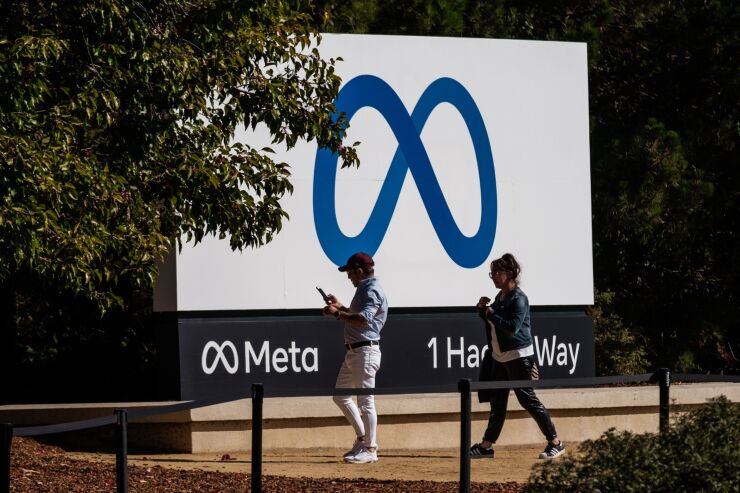When Facebook changed its name to Meta Platforms, the new identity was close enough to the name of an existing bank that it led to a naming rights deal.
The bank, Meta Financial Group in Sioux Falls, South Dakota, has said little about its plans for the financial windfall from Facebook. It largely provides its banking services by working behind the scenes for other companies, such as H&R Block, so the need to undergo a name change could be less disruptive than it would be for a bank with more of a retail emphasis.
The bank and the social network earlier this week agreed to a $60 million deal for the Meta brand, as well as associated names like Meta Financial, domain names and social media accounts.
"MetaBank partners with program managers, so it won't make much of a difference if the bank changes its name," said Fran Schiraldi, a managing director at Piper Sandler in New York who follows Meta Financial Group, the holding company for the $7 billion-asset MetaBank.
"MetaBank has handled many financial services over the years, and it was already talking about rebranding," Schiraldi said.

According to a filing with the
MetaBank is due to receive $50 million upon formal execution of the agreement, with $10 million being held in escrow by a third-party agent, to be delivered within three business days of the bank's phaseout of the Meta brand.
"It's like found money," Schiraldi said, estimating the rebrand will cost MetaBank $10 million to $15 million. MetaBank has fewer than a dozen branches or offices, mostly in the upper Midwest.
MetaBank's tax division provides refund transfer software and tax refund advance loans through tax preparers including Jackson Hewitt and H&R Block. MetaBank's consumer lending division works through partners, and its commercial lending division includes subsidiaries Crestmark and AFEX/IBEX.
In an email, MetaBank said it was aware of the relationship between Beige Key LLC and Meta Platforms before entering into the naming rights agreement. MetaBank did not comment further on its branding strategy or plans for the $60 million the bank is set to receive from Facebook.
In the SEC filing, MetaBank said it plans to use a portion of the proceeds from the deal to pay for a new corporate name, and will provide an estimate of the cost of rebranding in its next quarterly earnings report, scheduled for late January. It will use the rest of the rebranding funds for "general corporate purposes."
MetaBank has most recently increased its focus on financial inclusion, which is also one of the stated goals of Facebook's financial services strategy to be delivered through the Novi Wallet and the pending Diem stablecoin.
MetaBank's former CEO, Brand Hanson,
The company formerly known as Facebook confirmed the naming rights deal with MetaBank but would not comment further.
The MetaBank-Facebook naming rights deal comes at nearly the same time as one of MetaBank's partners,
H&R Block is expanding its digital payments business through its partnership with MetaBank, hoping to encourage broader use of the tax preparer's prepaid card. Square's expansion includes tax services, among other financial products tied to its Cash App.
"Branding is more important for certain brands," Schiraldi said. "H&R Block has had storefronts for years and has done years of marketing around that name."
For the technology-focused companies, the brand maneuvering is partly an attempt to forge a distinct identity for firms that are adding products that are different from their original mission, according to Tim Sloane, vice president of payments innovation at Mercator Advisory Group Group in Concord, Massachusetts.
"The most common examples of consumer oriented businesses suggest that a name change is a business structure or a financial issue and not a name recognition issue," Sloane said. "Alphabet remains unknown to most except its investors that perhaps now look more deeply at Alphabet's different lines of business. Everyone else knows Google."





